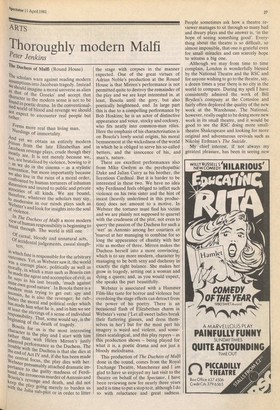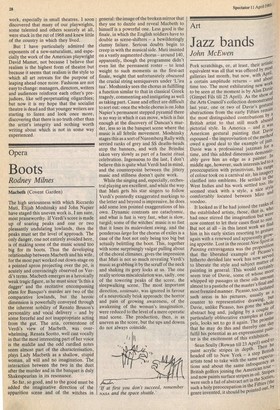Thoroughly modern Malfi
Peter Jenkins
The Duchess of Malfi (Round House) The scholars warn against reading modern assumptions into Jacobean tragedy. Instead we should imagine a moral universe as alien IS that of the Greeks' and accept that c,,haracter in the modern sense is not to be Mund in poetic drama. In the conventionalised world of blood and revenge we should not expect to encounter real people but rather: Porms more real than living man, Nurslings of immortality. And yet we obtain an entirely modern frisson from the late Elizabethan and Jacobean revenge plays, crude though they *mostly are. It is not merely because we, '00, are brutalised by violence, bowing to it as voe do in the cinema as a stylistic Convention, but more importantly because We also live in the ruins of a moral order, e(Mfronted by human torturers of inhuman dimension and inured to public and private atrocities of all kinds. We are bound, therefore, whatever the scholars may say, „.4) modernise in our minds plays such as Webster and look for insights into the soul of violence, In The Duchess of Malfi a more modern Lview of human responsibility is beginning to ureak through. The world is still one Of carnal, bloody and unnatural acts, Of accidental judgements, casual slaughters, in which fate is responsible for the arbitrary Outcomes. Yet, as Webster saw it, the world Was a corrupt place, politically as well as iorally, in which a man such as Bosola can i!ll he made the agent and accomplice of evil, as says in his last breath, 'much against modern own good nature'. In Bosola there is a alodern man trying to get out: spy and aks.sassio, he is also the revenger; he rubit-ashes the moral and political order which has made him what he is, and in him we see at least the stirrings of a sense of individual r,esPonsibility. That, some would say, is the °eginning of the death of tragedy. Bosola for us is the most interesting character in the play and I start with him rather than with Helen Mirren's justly trouble performance as the Duchess. The the with the Duchess is that she dies at Te end of Act IV and, if she has been made ;p_e central focus, the play dies with her. Webster presumably, attached dramatic importance to the guilty madness of Ferdi!and, the erroneous murder of Antonio and keep revenge and death, and did not 1(e13 the Play going merely to burden us with the Julia sub-plot or in order to litter the stage with corpses in the manner expected. One of the great virtues of Adrian Noble's production at the Round House is that Mirren's performance is not permitted quite to destroy the remainder of the play and we are kept interested in, at least, Bosola until the gory, but also poetically heightened, end. In large part this is due to a compelling performance by Bob Hoskins; he is an actor of distinctive appearance and voice, stocky and cockney, who fits neatly into common-man roles. Here the emphasis of his characterisation is on Bosala's lowly social origins, his moral bemusement at the wickedness of the world in which he is obliged to serve his so-called betters, and the innocence of his, and man's, nature.
There are excellent performances also from Mike Gwilym as the psychopathic Duke and Julian Curry as his brother, the licentious Cardinal. But it is harder to be interested in these two. We have no idea why Ferdinand feels obliged to inflict such violence on his twin sister and the hint of incest (heavily underlined in this production) does not amount to a motive. In Webster the torturer must find his victim and we are plainly not supposed to quarrel with the crudeness of the plot, not even to query the passion of the Duchess for such a 'wee as Antonio among her courtiers or 'marvel at her managing to combine for so long the appearance of chastity with her rOle as mother of three. Mirren makes the Duchess herself into a more convincing, which is to say more modern, character by managing to be both sexy and duchessy in exactly the right balance. She makes her grow in tragedy, setting out a woman and dying a queen; and, as you would expect, she speaks the part beautifully.
Webster is associated with a Hammer Filth-like taste for horror and violence but overdoing the stage effects can detract from the power of his poetry. There is an occasional flash of Elizabethan charm in Webster's verse Met all sweet ladies break their flattering glasses, and dress themselves in her') but for the most part his imagery is weird and violent, and sometimes scatalogical, and this play repays as this production shows being played for what it is, a poetic drama and not just a bloody melodrama.
This production of The Duchess of Malfi done in the round, comes from the Royal Exchange Theatre, Manchester and I am glad to have so enjoyed my last visit to the theatre on behalf of the Spectator. I have been reviewing now for nearly three years and it is time to put a stop to it, although I do so with reluctance and great sadness. People sometimes ask how a theatre reviewer manages to sit through so many bad and dreary plays and the answer is, 'in the hope of seeing something good'. Everything about the theatre is so difficult, so almost impossible, that one is grateful even for small miracles and can scarcely hope to witness a big one.
Although we may from time to time complain, London is wonderfully blessed by the National Theatre and the RSC and for anyone wishing to go to the theatre, say, a dozen times a year there is no city in the world to compare. During my spell I have consistently admired the work of Bill Bryden's company at the Cottesloe and fairly often deplored the quality of the new work at the Warehouse. The National, however, really ought to be doing more new work in its small theatre, and it would be good to see the RSC doing more smalltheatre Shakespeare and looking for more original and adventurous revivals such as Nikolai Erdman's The Suicide.
My chief interest, if not always my greatest pleasure, has been in seeing new work, especially in small theatres. I soon discovered that many of our playwrights, some talented and others scarcely at all, were stuck in the rut of 1968 and knew little of the country in which they lived.
But I have particularly admired the exponents of a new-naturalism, and especially the work of the American playwright David Mainet, not because I believe that realism is the highest form of theatre but because it seems that realism is the style to which all art retreats for the purpose of leaping ahead once more. Fashions are not easy to change: managers, directors, writers and audiences reinforce each other's prejudices, like self-perpetuating oligarchies; but now it is my hope that the socialist theatre is dead and that younger writers are starting to listen and look once more, discovering that there is no truth other than the artist's integrity and nothing worth writing about which is not in some way experienced.











































 Previous page
Previous page